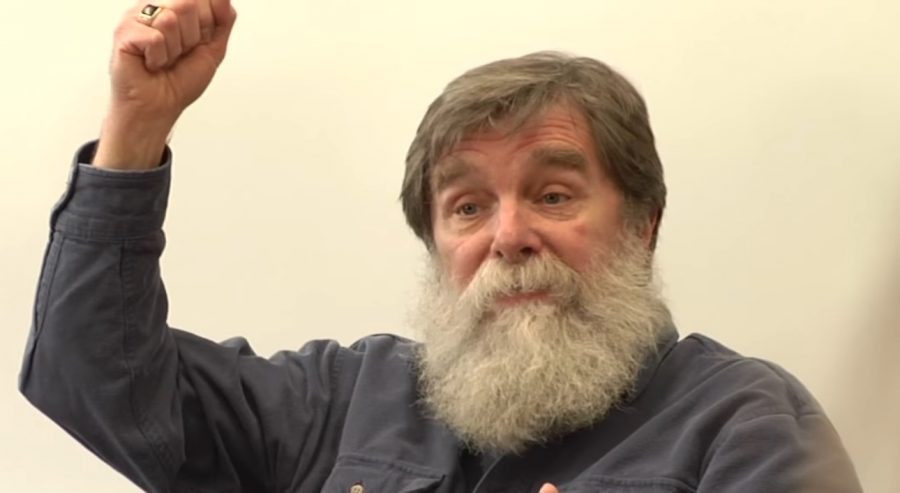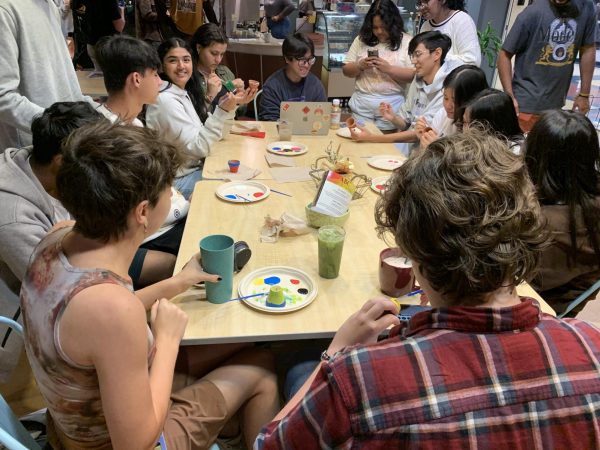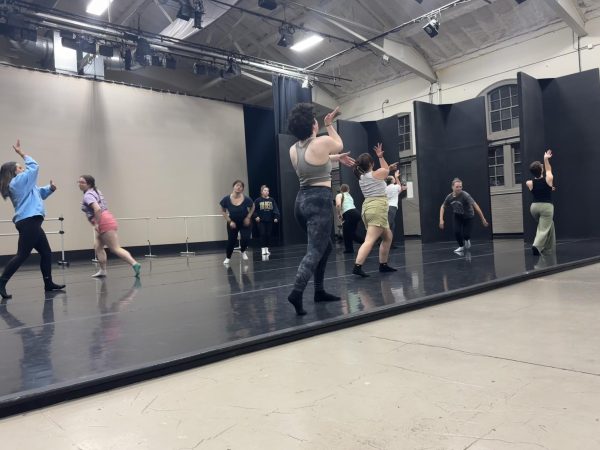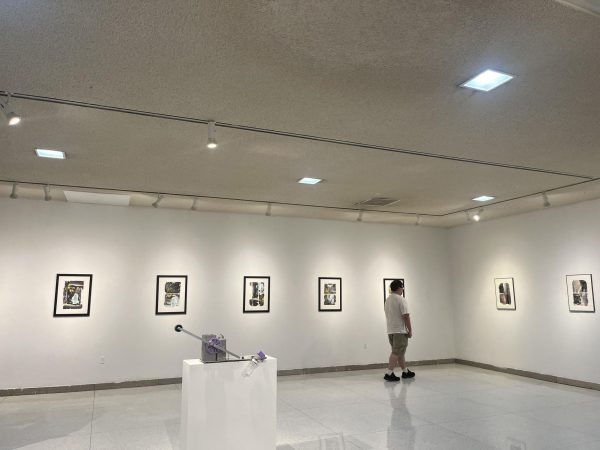Man of labor and ideals: Honoring Smith’s legacy
Allegheny community gathers in Ford Memorial Chapel to celebrate late professor
Bruce Smith taught at Allegheny College for more than 30 years. Students, faculty, administrators and alumni gathered in Ford Memorial Chapel on Saturday, Oct. 20, 2018 to honor the late political science professor.
Professor Emeritus of Political Science Bruce Smith’s favorite jazz music played softly over the chatter of attendees as they paid their respects to a chest containing a hand-made doll of Smith, positioned in a lighthearted parody of a coffin. Brightly colored flannels popped against the monochromatic colors in the chapel, with attendees donning the casual outfits in honor of Smith’s working-class background.
Students and faculty, clad in flannels and ready to share their favorite stories about Smith, crowded into Ford Memorial Chapel for a Celebration of Life for Smith on Saturday, Oct. 20. Faculty members, both current and retired, talked about their professional and personal interactions with Smith, who died from melanoma on July 13, 2018.
Despite the seriousness of the occasion, attendees spoke about Smith with nostalgia and laughter to honor their colleague. As he began speaking about Smith, Allegheny College President James Mullen mentioned the draw people felt to honor Smith.
“As only John McCain could get Presidents Bush and Obama to stand at his memorial service and say nice things about him, only Bruce could get Bulman, and Cook, and yours truly dressed up in flannel shirts and older folks’ jeans to stand before you today and say nice things about him,” Mullen said.
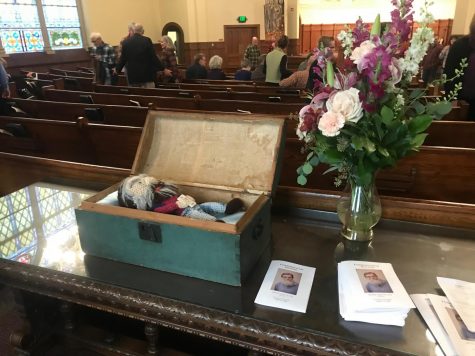
A hand-made doll representing Bruce Smith offered a lighthearted representation of the professor at his Celebration of Life on Oct. 20, 2018, in Ford Memorial Chapel.
Describing Smith as his trusted mentor and true friend, Mullen said Smith never forgot his working-class past, even as he moved into his future and created a legacy at Allegheny as an academic.
“As I reflect on Bruce’s impact on our college, it is the content of his character that defines his impact as a teacher, a scholar, a dean and a colleague,” Mullen said. “Bruce Smith never forgot where he came from.”
Prior to working at Allegheny, Smith was a construction worker, a job which gave him working-class roots he never lost. Jason Smith, Smith’s son, talked about living with a father who was both an academic and a construction worker.
“I’ve sometimes remarked that, when asked about my father, growing up, I actually had two dads: the construction worker, working-class dad until I was 11 and the academic, political theory professor,” Jason Smith said. “This isn’t really a description of my father as much as it was a description of the trajectory of history. He was always an intellectual … My father was always both a man of labor and a man of ideals.”
Smith’s inclination toward challenging and questioning authority, even Mullen’s authority, often resulted in the two colleagues meeting for a “summit” at Safari Bar in Meadville, according to Mullen.
“Eventually, (the summits) became something of a tradition held at the end of each semester,” Mullen said. “In these summits, we would ruminate about issues on our campus, challenges facing our nation and the course of American politics. We would argue when the moment called for it, and we would agree that we both believe profoundly in our college. And I will miss those summits dearly.”
Professor of Political Science Shannan Mattiace said she read through hundreds of emails from Smith with the hope of capturing his personality and the impact he had on both the department and college.
“Ultimately, I landed on this: For Bruce, the basic project of liberal education was to teach students how to think, not what to think,” Mattiace said. “Bruce was adamant in his belief that the liberal education was about cultivating skepticism, not consensus.”
Even though Smith fiercely defended his beliefs, he was never uncivil, according to Mattiace.
“He could interrupt us and talk over us at times, but he always took us seriously,” Mattiace said. “He was acutely interested in what mattered intellectually to each one of us … and I think that was one of the keys to Bruce’s success in the classroom.”
Smith’s success as a professor that Mattiace mentioned was reflected in the memories shared by his former student, Allegheny alumna Alexandria Lappas, ’11. Lappas, whose father is an Allegheny alumnus, said she did not understand why her father felt such a pull to Allegheny even decades after he graduated.
“I (understand) now,” Lappas said. “It’s because he was lucky enough to have professors like Bruce Smith.”
During her first year at Allegheny, Lappas said she quickly learned Smith would challenge her in his first-year seminar. The first paper she wrote for him was returned covered in comments, all marked in a red pen. Even with the numerous comments and criticisms, Lappas had been the only one in the class to receive an A.
“It was in that moment, seeing Bruce’s red scrawl all over the pages, that I realized in college, or in his class at least, I could have conversations with my professors,” Lappas said. “It wasn’t until I met Professor Smith that I realized I could turn a love of learning into a discipline, I could hone my intellectual capabilities and use my point of view to develop my own intellectual voice. … That is a beautiful gift to give to someone. I will always be grateful for it.”
Similar to her father, Lappas said she found a professor that connected her to Allegheny.
“He was surely the best teacher I ever had,” Lappas said. “He was my intellectual mentor, a fierce champion of the working class, a true and devoted educator, a student of history. … In another life, I think we would have been friends, but in this life, I am grateful that he was my teacher.”
Smith often defended departmental and faculty autonomy, according to Mattiace, a fact which made faculty and administrators surprised when he accepted the role of dean of the college in 1996, during former Allegheny College President Richard Cook’s term.
“He was a union fighter, he never had been an administrator, never wanted to be an administrator — in fact, he didn’t trust administrators,” Cook said. “He insisted that we engage in reform that mattered.”
Smith fought for the underdog and helped the administration in enduring ways, according to Cook. Even with the success he had as dean of the college, Smith only wanted to return to the classroom and his job as a professor, Cook said.
“He despised being dean,” Cook said. “He couldn’t wait to go back to the classroom, so why was he dean? Because he knew he needed to do it for the institution. He was exactly the right person to do what we had to do.”
Professor of English James Bulman also spoke on Smith’s role as dean, explaining that, despite the collective shock of faculty members when they learned he had accepted the role, Smith exceeded expectations.
“There was no one better equipped to do that job,” Bulman said. “He was a person whose opinions I valued more than anyone else’s … He was … as I came to find out, a steadfast and loyal friend.”
Smith’s impact on Allegheny, both as dean and a professor, was ultimately summarized by Mullen, in his closing remarks about his late colleague.
“Bruce Smith was the real deal,” Mullen said. “We are so lucky he was, and always will be — one of us.”
11:20 p.m. Thursday, Oct. 25, An earlier version of this story reported Smith served as dean of students; however, it has been corrected to accurately report Smith served as dean of the college.
Lauren Trimber is a senior majoring in English and creative writing and minoring in political science. This is her third year on staff, and she will be...



